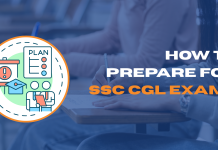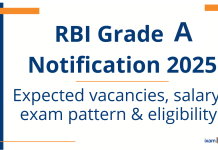The General Awareness section is one of the highest-scoring topics in the RBI Grade B exam. Therefore, it needs to be given its due importance when you prepare for this exam. In this article, we will understand how to prepare general awareness for the RBI Grade B Exam with best tips and tricks to score good marks in General Awareness. We will understand the important topics for general awareness and the sources to refer to.

General Awareness Weightage in RBI Grade B
40% of Phase 1 of RBI Grade B exam is General Awareness and GA preparation will immensely help you in Phase 2 ESI and to some extent in FM papers. Remember that all Banking, Finance, Economy News cater to both Phase 1 and Phase 2 as Phase 2 also revolves around Current Affairs, so aim for both. Your understanding of current affairs topics will further your thoughts on essay writing in English Descriptive paper of Phase 2.
Therefore, your General Awareness preparation requires an in-depth understanding of news with special attention to news related to economics, governance, finance, banking, and other relevant topics. Therefore, if you plan in a systematic manner, you can score 60 plus marks in General Awareness.
RBI Grade B Phase 1 Exam Pattern
RBI Grade B Prelims Exam Pattern consists of four sections- English Language, Reasoning Ability, Quantitative Aptitude, and General Awareness. You will be given a total of 120 minutes to solve the exam. RBI Grade B Prelims exam will have a sectional time limit also that will be informed later by RBI.
| Subject | No. of questions | No. of Marks |
| General Awareness | 80 | 80 |
| Reasoning | 60 | 60 |
| Quantitative Aptitude | 30 | 30 |
| English | 30 | 30 |
| Total | 200 | 200 |
- The paper will be objective in nature.
- General Awareness holds 80 marks which are the maximum amidst all the sections.
- There will be 80 questions of 80 marks for which you will get the sectional timing.
- This section having 80 marks can really make or mar your chances of clearing Phase I.
- You really need to be prepared with the General Awareness section to ensure that you answer as many questions correctly as possible. And to be on that level, you need to start your preparation today.
How to Prepare the General Awareness Section?
From a thorough analysis of the RBI previous year cutoffs, you can score 60+ marks in this section if you have prepared it properly. From the perspective of RBI Grade B 2025 Phase I preparation, General Awareness can be divided into 3 parts:
- Static Awareness
- Static Banking & Economy Awareness
- Current Affairs
Let’s have a look at the preparation resources of each of these parts. Preparing from these resources will definitely help you score good marks in the General Awareness section.
Static Awareness Preparation
In the past years’ question papers of RBI Grade B Phase I, it was observed that 10-15 questions were asked from Static GK. The questions may include the areas mentioned below.
- Dams and Thermal Power Plants
- National Parks
- Wildlife Sanctuaries and Biodiversity Hotspots
- Government Initiatives
- Indian Cities on River Banks
- Important Days of the Year
- International Current Affairs like sports, conferences and such.
- Stadiums in India
- Famous Monuments and Temples
- Countries and Capitals
- Cabinet Ministers, CMs and Governors
- International Organizations and their headquarters (Cover those who are in news in last 6 months from exam date)
These above topics should be enough to cover maximum questions for Static GK in RBI Grade B 2025 Phase I.
Since static GK involves memorization, regular revision is essential. Allocate a small time slot daily for static GK, and break down topics to cover each one methodically. Use tools like flashcards or online apps to keep revisiting topics in an interactive way, which helps improve retention. Dedicate specific days for reviewing past notes, like one day per week to revisit what you’ve studied during the week. This repeated exposure will reinforce your memory.
RBI notifications, reports, and publications are also useful as they sometimes form the basis for exam questions, especially around Indian economy and financial institutions. Enroll in online courses or mock tests (like ixamBee’s RBI Grade B XtremeBee Plus Online Course) that include static GK to practice with RBI exam-specific questions.
Summarize important information in concise notes. Use tables, bullet points, or mind maps to organize facts by topic, which makes revision easier. For topics like states and their capitals, major national parks, or important international organizations, keep a small handbook for quick reference. This is especially useful for reviewing during breaks or just before the exam.
Static Banking & Economy Awareness
This is one of the important parts of the General Awareness section of RBI Grade B Phase I. Since you will be working for the apex bank of India, you need to be very thorough with banking terminologies like repo rate, MSF, CAGR, BIS and others. This section will have 15-25 questions asked.
Focus on building a solid foundation in banking concepts like monetary policy, the role of RBI, types of banks, and the history of Indian banking. Key terms such as CRR, SLR, Repo Rate, Reverse Repo Rate, and their impact on the economy are essential to understand in detail.
The RBI Grade B exam often includes questions on significant banking reforms and regulatory changes. Important topics include NPAs, mergers of banks, prompt corrective action (PCA), Basel norms, and financial inclusion initiatives.
Terms such as inflation, deflation, GDP, fiscal policy, and capital markets often appear in the exam. Besides definitions, understand the context in which these terms are used and their effect on the economy.
Practicing RBI previous year papers helps you familiarize yourself with the types of questions commonly asked. This will also show you how deeply you need to study each topic.

Current Affairs
Current Affairs is the most important part of the General Awareness section. Almost 50-60 questions are asked from this area. Be thorough with the last 4 months of current affairs. Keep updating your current affairs even until a couple of days before the Phase I exam date. At times, current affairs questions in RBI Grade B Phase I exam were based on the events that occurred 2-3 days before the exam date.
Categorize current affairs into sections like banking news, government schemes, international relations, and economic policies. This will help in structured revision and prevent information overload. Keep a separate notebook or digital document where you summarize key points from each category. Creating monthly summaries can help reinforce information and aid in quick revision. Practicing current affairs quizzes and mock tests specific to the RBI Grade B syllabus can improve recall and time management. Many platforms, including ixamBee, provide topic-based current affairs quizzes and RBI Grade B mock tests. After each quiz, review your answers to understand the rationale behind them. Pay attention to explanations provided to strengthen conceptual clarity. You can also practice with daily Current Affairs quizzes.
Where to cover all these?
Financial awareness & static GK is also covered in newspapers & in our BeePedia (available for free on a weekly as well as monthly basis). BeePedia is a comprehensive document to address the General Awareness (GA) content requirement. BeePedia covers Current Affairs, Banking Awareness, Economic news updates and Financial news updates, weekly Current Affairs, Banking Awareness, the updates from various government ministries and the Press Information Bureau (PIB). It also covers the relevant static information related to current affairs/news to provide you the convenience of all related information at one place.
Things You Must to Do
- Study & Revise: Read Beepedia monthly compilation on a regular basis and keep revising the old weekly PDFs ones as well.
- Mock tests: Take current affairs mocks on a regular basis to check your knowledge level. Be it the RBI Grade B phase 1 or RBI Grade B phase 2, the duration of these phases is limited and also has negative marking for every wrong answer, hence it is imperative that you take RBI Grade B Phase 1 free mock tests in order to test your time management skills.
- Read the Financial Express to stay updated with the latest economy and financial updates.
What Not to Read?
- RBI Website: Now is not the time to dive in the content of RBI website. All the related and necessary information are already mentioned in the BeePedia.
- Full Document on Budget & Economic Survey: Reading the complete document is a waste of time and energy. Reading the Union Budget Key Highlights will do the trick. Economic survey is important to read to know the change in the current financial year. But the whole document is not for the examination purpose.
- With the changing pattern, do not aim for perfection. An average score in GA would be sufficient considering the paper will be on a similar level as last year where the cutoff was 67.
Study with ixamBee
Remember the concept of ROTI? Return on Time Invested. Time is your best friend. The more you will invest the more you will get. Kickstart your RBI Grade B exam preparation with our RBI Grade B Exclusive Online Course curated on the latest exam pattern with study plan for descriptive papers.
If you have any input/feedback for us, please let us know in the comments section below.
All the very best!
At ixamBee, we specialize in providing comprehensive online courses for government exams and online courses for government jobs. Our expertly designed courses for government jobs cater to a wide range of upcoming government exams. Whether you’re preparing for specific courses for government exams or seeking general guidance, ixamBee offers the resources like Beepedia previous year papers, SSC CGL, SSC CHSL, SSC MTS and other mock tests to succeed in exams like RBI Grade B, SEBI Grade A, NABARD Grade A, RRB NTPC, SSC MTS, NIACL Assistant, and more.
Also Read
RBI Grade B 2024: How to Approach ESI Descriptive Paper?
Achieve the Perfect Score – 30 out of 30 in Quant!
RBI Grade B Officer Salary: In-hand Salary, Pay Scale, Perks & Benefits
Perks of being an RBI Grade B Officer














